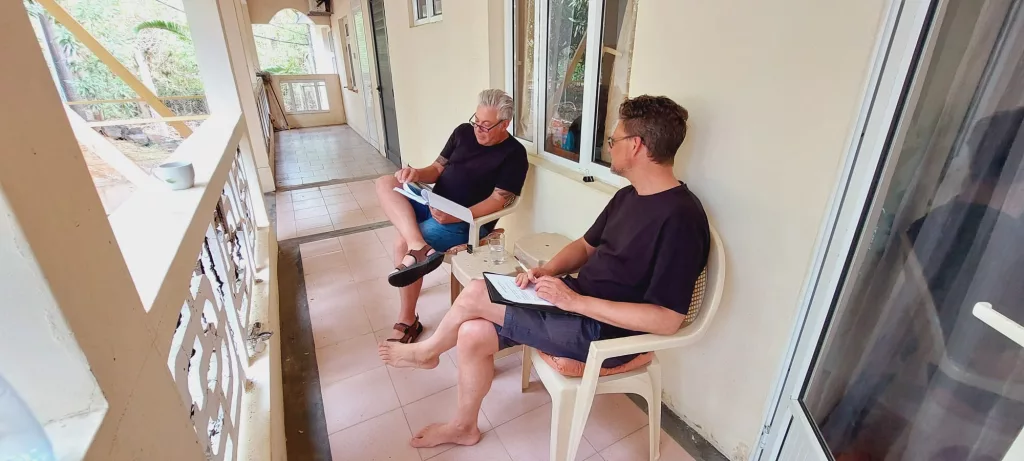How are energy security and maritime security intertwined? In a new article forthcoming in Ocean Yearbook, Tim Edmunds and I discuss the threats and risks linked to offshore wind energy platforms. We discuss the different scenarios that arise from marine safety, blue crime, terrorism and greyzone war fare, as well as different mitigation and response options from civil, military and private actors. The article is available as a pre-print here.
Category Archives: Publications
New article on critical maritime infrastructure protection
Critical maritime infrastructure protection (CMIP) is since the Nord Stream attacks in the Baltic Sea of 2022 a political priority. What are maritime infrastructures, what threats and risks are they facing, and how can they be best protected? These are the questions we address in a new article now out as open access with Marine Policy.
New article on global ocean politics
In a new article published in International Affairs, Felix Mallin and I investigate the current state of global ocean politics. Highlighting the dramatic changes in awareness and rethinking the oceans, we show how the debate is increasingly organized by four new ‘blue paradigms’: maritime security, blue economy, ocean health, and blue justice.
We explore each of the blue paradigms in detail and discuss how they render the current state of the oceans problematic in different ways. In consequence, the proposed policy solutions and instruments diverge quite substantially, and new ways of forging synergies between the paradigms must be identified.
New article explores communities of practice and global ocean governance
In a new article that has just been accepted by Global Studies Quarterly, Maren Hofius, Scott Edwards and I address a major question of recent ‘community of practice’ theories. Community of practice is one of the major strands of international practice theory. Yet, it has often been of limited use, since it narrowly investigates isolated community. Pushing the debate forward we ask: If the world is populated by communities of practice, how do these interact?
We propose a new analytical framework through which we can study this interaction. To illustrate its value we discuss instances of ocean governance. We show how ocean summits, special representatives and maritime domain awareness are spaces and actors that facilitate interaction.
How can assemblage thinking help to understand contemporary governance?

In a new book chapter that came out today, Tobias Liebetrau and I show how one can use assemblage theory to understand complex polycentric governance processes. The chapter provides an easily accessible introduction to assemblage thinking and shows it can be used as an analytical framework. We discuss empirical examples from maritime security and cyber security that show how we can better understood governance tools, such as best practices and public-private partnerships.
The chapter is part of a volume, edited by Frank Gadinger and Jan Aart Scholte which provides a concise introduction of different theoretical approaches to polycentric governance. It is published with Oxford University Press and available for free here.
What’s the role of academia in maritime security? New commentary
In 2022 the RSIS in Singapore launched a small research project attempting to identify the various roles that types of stakeholders, such as navies, the industry or NGOs have. The initiative led by John Bradford, provides a great overview of how diverse these roles are, and how positions and interests differ.
In my contribution to the project, I discuss the role of academics based in university and think tanks. I show that the field of maritime security research has been substantially growing and provide some distinctions for orientation: curiosity vs. policy driven research and objectivist vs. interpretivist analyses. I argue that research can make substantial difference in enhancing practical reflexivity, providing conceptual clarifications, developing models to sort the complexity of maritime security, or identifying gaps and misalignments in responses.
Writing retreat in Mauritius
In the past week, Tim Edmunds and I, were holding a writing retreat in Mauritius. We also visited the Wakashio accident site, and the Indian Ocean Commission. Primarily we used the time to put the final touches on our forthcoming book Understanding Maritime Security.

The main objective of the book is to provide readers at different levels with a concise and coherent introduction to maritime security. Our focus is on essential knowledge – need to know, not nice to know. We hope to reach readers with different levels of experience, from the complete beginner, to those who already look back on a professional career in maritime security related tasks, as well as those who are students enrolled at universities and in active professional careers. The book is scheduled to come out in 2023. Contact me per email or social media if you are interested in reviewing a draft chapter.
Consequences of the Nord Stream sabotage
The sabotage of the Nord Stream pipelines has drawn unprecedented attention to the under water domain and the criticality of subsea infrastructures. Indeed, the world economy depends on the ocean floor as never before in history. It is pipelines, electricity cables, and data cables, that connect the global economy.
Drawing on the research conducted as part of our ocean infrastructure research group, in particular our work on subsea data cables, I have been commenting in several news outlets on this issue, including the Wall Street Journal, Der Spiegel, and others. See the overview here.
An independent commentary on the consequences for the EU was published by The Conversation. A commentary co-authored with Tobias Liebetrau published in The Loop argues that we have to change our perspective of the under water space more generally.
The European Parliament discussed our report on October 6th and announced that our recommendations will inform an action plan on the protection of underwater infrastructures. In response, I published a commentary in EUObserver arguing that the action plan of the commission is not sufficient.
New commentary on India’s role in collective maritime security
As more and more geopolitical attention turns to the Western Indian Ocean, in a new commentary I explore the role of India in collective maritime security. I argue that India should continue on the course it charted last year in the UN Security Council: to work towards collective multilateral maritime security mechanisms on a regional and global level.
New Commentary on security in the Western Indian Ocean
In early 2022 a subtle, but substantial shift took place in the Western Indian Ocean’s security architecture: The Contact Group on Piracy off the Coast of Somalia (known as CGPCS) closed shop. It was replaced by a new format. Yet, not much action followed. In a new commentary, I investigates the prospects of the new grouping. Running through four scenarios, I argue that the group is most likely going to become a sleeping beauty.